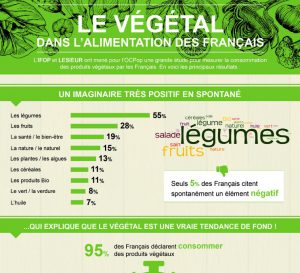The perception of plant-based foods in France has changed over the last decade. Vegetables are now perceived as a response to important dietary goals and associated with the pleasure of “eating well”. The results of this survey by L’Observatoire des Cuisines are summarised in an infographic. It is a definite eye-opener.
More and more vegetables on our plates
This exclusive study by Ifop/Lesieur for L’Observatoire des Cuisines Populaires (OCPop), a website that discovers and publishes trends in everyday eating in France, investigated the role of plant-based foods (fruit, vegetables, plants, cereals, pulses etc.) in the diet of French people: what were the reasons motivating them to eat plant-based foods?
The first finding was that plant-based foods are becoming trendy, taking up more and more space on our plates, in contrast to the smaller role they played a few years ago. This assimilation can be explained mainly by the positive perception of plant-based foods among the great majority of French people: they believe that a plant-based diet is better for their physical health (at present and in the future) and helps to keep their weight down.
It is hardly surprising that 50% of French people say they want to increase their consumption of plant-based products in the years to come. Another reason for doing so is that plant-based foods are associated with pleasure and mental wellbeing. Why? The last thing the French want is a monotonous diet! In a variety of shapes, colours and textures, plant-based foods offer a wide range of delicious tastes and pleasure for the senses.
 More vegetables, less meat
More vegetables, less meat
Another important result of the study is that 22% of people who have increased their consumption of plant-based foods have done so to prevent animals from suffering. This confirms the growing disaffection with meat, a phenomenon that can also be observed in other countries.
Finally, the study also reveals that this revival of interest in vegetables is linked to certain of their intrinsic properties. Vegetables are often less highly processed and more natural, and as such they respond to the quest for “naturalness” and “nature” observed in contemporary consumers’ behaviour over recent years. This is a tendency that is shaping their diets.
The infographic produced byOCPop summarises the key messages of this study. Download it from the Observatoire des Cuisines Populaires website



 Parsley
Parsley  Bean sprouts
Bean sprouts  Vegetable garden: growing zucchini (courgette)
Vegetable garden: growing zucchini (courgette) 









